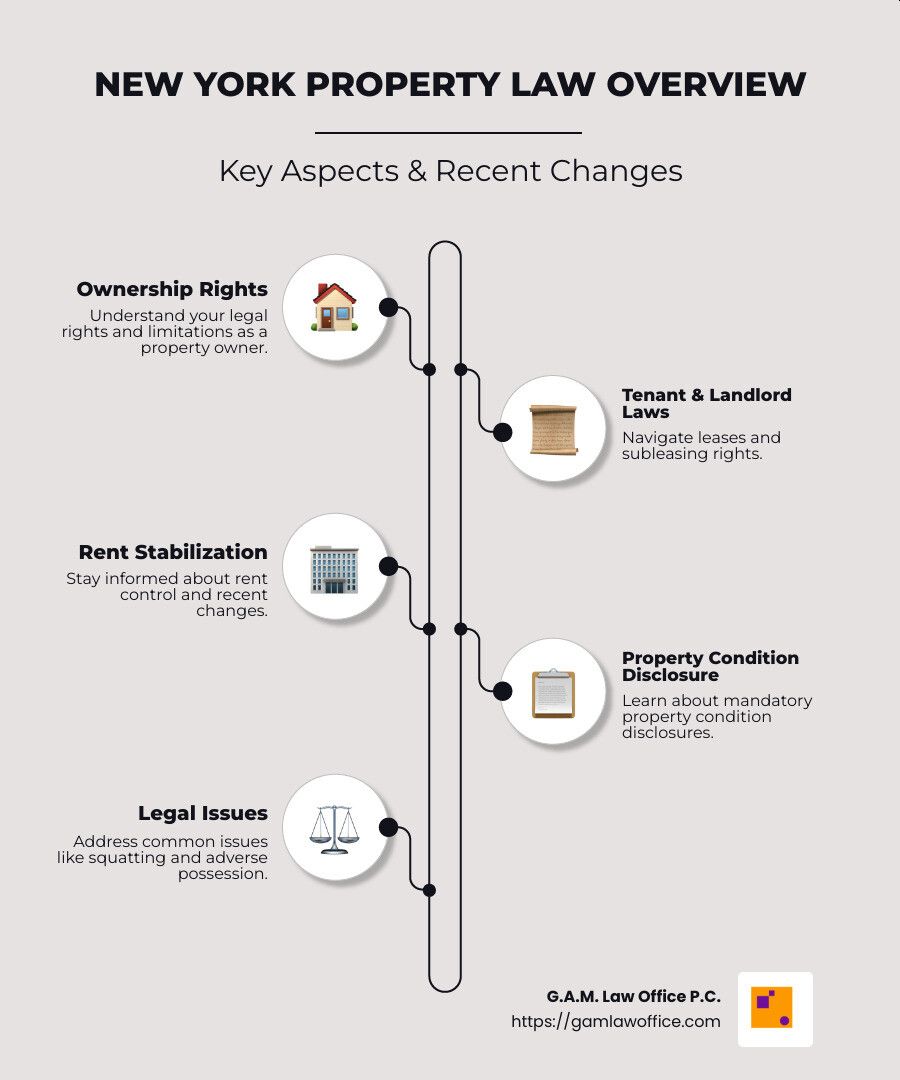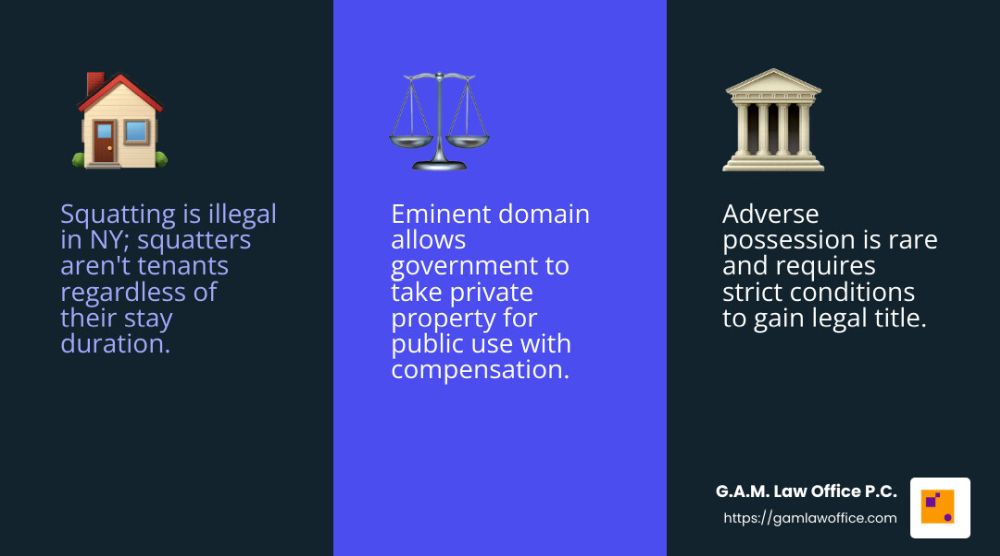- within Real Estate and Construction topic(s)
- in United States
- within Wealth Management topic(s)
New York property law is a complex field that governs everything from land ownership to tenant rights in the state. If you've ever found yourself tangled in complicated legal jargon or unsure how property legislation affects you, you're not alone. This guide aims to simplify all you need to know about property laws in New York.
Key Points:
- Ownership Rights: Understand your rights and limitations.
- Tenant and Landlord Laws: Steer leases and rights to sublease.
- Recent Legal Updates: Stay informed about changes like rent stabilization and broker fees.
- Common Legal Issues: Learn about squatting, adverse possession, and more.
Our purpose in this article is to provide clear and concise information about New York property law so you can feel confident in your legal standing, whether you're a property owner or a tenant. New York's legal landscape is dynamic and knowing your rights can save you from potential headaches and help you manage your property more effectively.
In this guide, we'll cover everything from fundamental ownership rights to the latest changes in property law. We'll also explore common legal issues you might face and provide answers to frequently asked questions, helping you steer the complex world of real estate with ease.

Understanding New York Property Law
Navigating the maze of New York property law can be daunting, but understanding the basics can empower property owners and tenants alike. Let's break down some of the key rights and responsibilities that come with owning or managing property in New York.
Key Rights of Property Owners
Ownership Rights and Limitations
Owning property in New York grants you various rights, but these come with certain limitations. You have the right to enjoy and use your property as you see fit, but this is subject to local zoning laws, environmental regulations, and other legal constraints.
Access Rights and Emergency Entry
As a property owner, you generally have the right to access your property. However, if it's leased, you must respect the tenant's right to privacy. Emergency situations, such as a fire or flood, may permit you to enter without prior notice, but it's crucial to understand what constitutes an emergency to avoid legal issues.
Tenant Abandonment
If a tenant abandons the property, you have specific rights and obligations. You can reclaim possession, but proper legal procedures must be followed to avoid claims of illegal eviction. Always document the situation thoroughly.
New York Real Property Law 236 and 223-A
Executor Rights
Under New York Real Property Law 236, executors of an estate have specific rights when dealing with property left by a deceased individual. They must manage and distribute the property according to the will or state laws if there is no will. Executors should be aware of their duties to avoid legal complications.
Possession Delivery
Real Property Law 223-A covers the remedies available to a lessee if possession isn't delivered as agreed. If a landlord fails to provide the property on the agreed date, the lessee can seek compensation or terminate the lease. This law ensures that tenants are not left without recourse if a landlord defaults.
Lease Implications
Leases in New York are binding contracts with significant legal implications. Both landlords and tenants must understand the terms, including rent, duration, and maintenance responsibilities. Changes to a lease, like subleasing, often require written consent from the landlord, governed by Real Property Law 226-b.
By understanding these key aspects of New York property law, property owners can better manage their assets, and tenants can protect their rights. Whether you're dealing with tenant issues or managing an estate, knowing the law helps you make informed decisions.
Next, we'll dig into recent changes in New York property law, including updates on rent stabilization and broker fees.
Recent Changes in New York Property Law
New York property law is changing, with recent changes impacting property condition disclosure, rent stabilization, and broker fees. Understanding these updates is crucial for both property owners and tenants.
Property Condition Disclosure Act
The Property Condition Disclosure Act requires sellers to provide a disclosure statement outlining the property's condition before a contract of sale is finalized. This ensures buyers are informed about potential issues, such as structural defects or environmental hazards, before making a purchase. Sellers who fail to provide this disclosure may face penalties, making it essential to comply with this law to avoid legal repercussions.
Rent Stabilization Laws
Rent stabilization laws in New York are designed to protect tenants from excessive rent hikes and ensure long-term housing stability. These laws apply to certain buildings in New York City and limit the amount landlords can increase rent annually.
In a recent decision, the U.S. Supreme Court declined to hear a challenge against New York City's rent stabilization laws, effectively upholding the existing regulations. This decision reinforces the city's commitment to maintaining affordable housing options and preventing tenant displacement. The laws primarily affect buildings constructed before 1974 with six or more units, covering nearly one million apartments.
Broker Fees
Broker fees have been a contentious issue in New York's real estate market. Traditionally, tenants have been required to pay significant fees to brokers when renting an apartment. However, there is growing momentum to eliminate these fees, shifting the financial burden to landlords. This change aims to make renting more accessible and affordable for tenants, though it has faced opposition from the real estate industry.
By staying informed about these recent changes in New York property law, both property owners and tenants can better steer the real estate landscape. Understanding these updates helps ensure compliance and protect your rights in the ever-changing legal environment.
Next, we'll explore common legal issues in property law, including squatting and adverse possession.
Common Legal Issues in Property Law
Navigating property law can be tricky, especially with issues like squatting, adverse possession, and eminent domain. These topics are not just legal jargon; they can have real impacts on property owners and tenants alike.
Squatting and Trespassing
Squatting is when someone occupies a property they do not own or rent. In New York, squatting was once a gray area, as squatters who stayed for more than 30 days were considered tenants. This made eviction a long and challenging process.
However, recent changes have clarified this issue. As of April 2023, New York legislators have worked on stricter measures so that squatters are not considered tenants, regardless of how long they've stayed. This update aims to streamline the eviction process and protect property owners from illegal inhabitation.
Legal Consequences: Trespassing, including squatting, is illegal. Property owners can now take quicker legal action to remove squatters. In some states, squatting can even lead to criminal charges.
Adverse Possession and Eminent Domain
Adverse Possession: This is a legal doctrine allowing someone to claim ownership of land they have occupied for a certain period, usually without the owner's permission. The idea is that if the true owner does not enforce their rights over many years, the possessor may gain legal title. However, these cases are rare and require strict conditions to be met.
Eminent Domain: This is the government's right to take private property for public use, like roads or schools. While property owners must be compensated, these involuntary transfers can be contentious. Eminent domain emphasizes the balance between individual property rights and broader community needs.

Understanding these common issues in New York property law helps both owners and tenants protect their rights and steer potential disputes. Next, we'll dive into frequently asked questions about property law in New York, providing clarity on owner rights, new laws, and tenant protections.
Frequently Asked Questions about New York Property Law
What are the rights of property owners in NY?
Property owners in New York have several key rights, but these often come with responsibilities and limitations.
- Owner Access: Property owners generally have the right to access their property. However, this right is balanced with tenant rights. For instance, landlords must provide notice before entering a rented property, except in emergencies. This ensures tenant privacy and consent.
- Tenant Consent: Before entering a tenant's space, landlords typically need to obtain tenant consent, except in cases of emergency or where the lease explicitly allows entry. This consent is crucial to maintaining a respectful landlord-tenant relationship.
What is the new real estate law in NY?
Recent updates to New York property law have introduced changes aimed at transparency and tenant protection.
- Property Condition Disclosure Act: This act requires sellers to provide a disclosure statement outlining the property's condition. This document must be given to potential buyers before the contract of sale is signed. The goal is to ensure buyers are fully informed about the property's state, reducing the likelihood of disputes after purchase.
- Effective Date: The Property Condition Disclosure Act came into effect to safeguard buyers, making it mandatory for sellers to disclose known issues, from structural defects to environmental hazards.
What is 'Good Cause Eviction'?
The Good Cause Eviction law is a significant development in tenant protection. It aims to prevent arbitrary or unfair evictions by requiring landlords to provide a valid reason for not renewing a lease.
- Lease Renewal: Under this law, landlords cannot refuse lease renewal without a legitimate reason, such as non-payment of rent or violating lease terms. This provides tenants with greater security and stability in their housing situation.
- Tenant Protection: The law improves tenant protection by ensuring that evictions are not used as a tool for rent hikes or to retaliate against tenants. It underscores the importance of fair treatment in the landlord-tenant relationship.
Understanding these aspects of New York property law can help both owners and tenants steer their rights and responsibilities. For more detailed information, consider consulting with a legal expert like those at G.A.M. Law Office P.C. who specialize in real property law.
Conclusion
Navigating New York property law can be complex, but understanding your rights and responsibilities is crucial whether you're a property owner, tenant, or investor. From the intricacies of the Property Condition Disclosure Act to the protections offered by rent stabilization laws, staying informed is key to making sound decisions.
G.A.M. Law Office P.C. is here to assist you with custom legal solutions. Our expertise ensures that you receive strategic advice and representation that aligns with your goals. We prioritize transparent communication, safeguarding your interests while fostering growth.
Whether you're dealing with lease agreements, seeking to understand recent legal changes, or facing potential disputes, our team is ready to provide the guidance you need. By partnering with us, you gain a trusted legal advisor committed to your success in the dynamic landscape of New York real estate.
The content of this article is intended to provide a general guide to the subject matter. Specialist advice should be sought about your specific circumstances.


